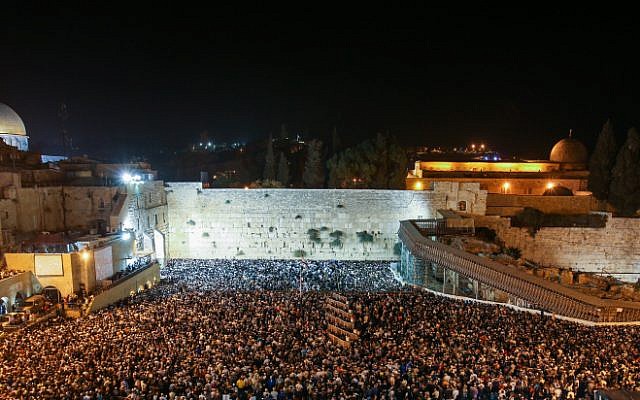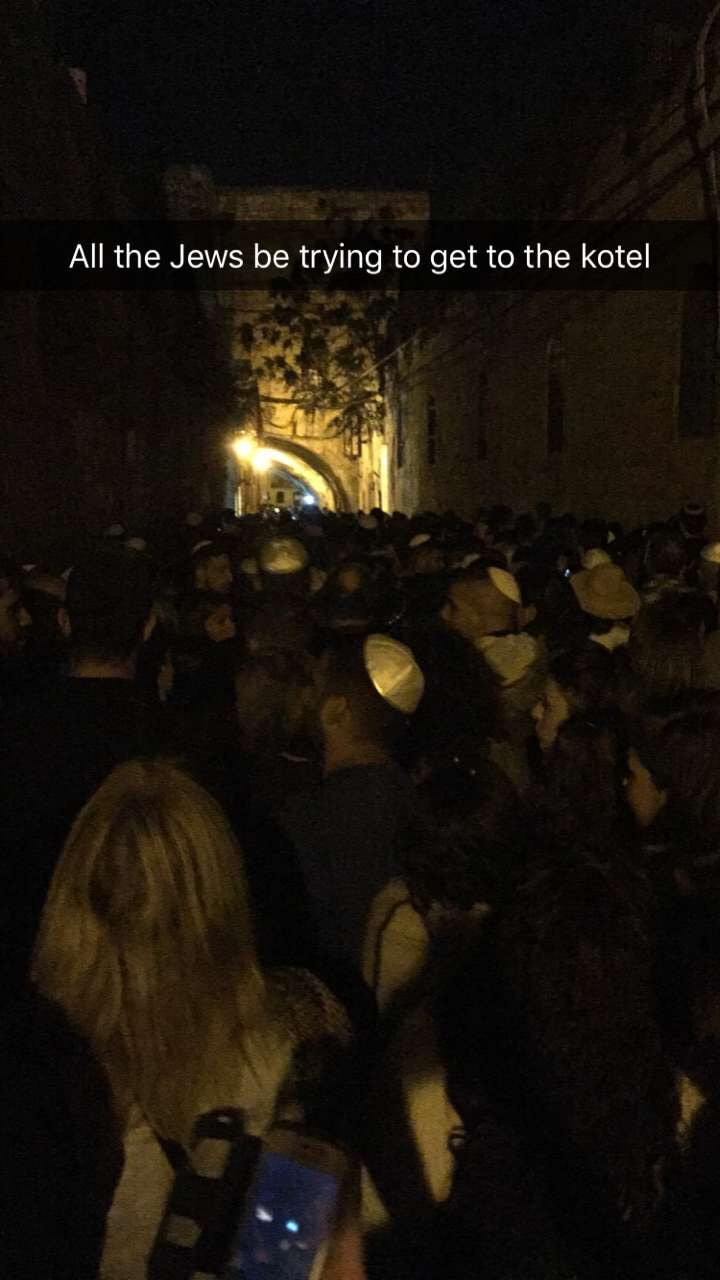|
Last night I had an amazing experience at The Kotel (Western Wall). I haven't been able to say that for some time. As I made my way into the Ancient City of Jerusalem, I joined in a throng of people headed to the wall that most closely resembled the crowds heading into a football stadium on Game Day on college campuses across America. The wall has been a flashpoint ever since Israel took control of the old city 50 years ago. In recent years, I have become much less comfortable praying at the wall both because praying to a wall seems somewhat un-Jewish and due to the horrendous treatment of women by the Western Wall Heritage Foundation (which oversees the wall), which is a חילול ה׳ a desecration of God's name. But last night, I gathered with tens of thousands of Jews at the wall for Selichot, the penitentiary prayers said in the days leading up to Yom Kippur, the day of judgement. If you were able to get close enough to the wall there were still the divided men's and women's sections, but where I was standing there was a true ערב רב, a mixed multitude of people. Ultra-orthodox men stood next to secular women and vice versa. Jews whose families came to Israel from Iraq and Morocco stood shoulder to shoulder with those who arrived from Poland and recent immigrants from America. We stood together in prayer, collectively chanted חטאנו לפניך רחם עלינו (we have sinned before you, have mercy on us). In the Avodah service read during the late morning (or early afternoon) on Yom Kippur we recall how in the days of the Temple the high priest would go into the holy of holies and pronounce the name of God, and when he would do so the Israelites in the courtyard would respond with a formulation found in the Torah as God's own description of Godsself:
ה׳ ה׳ אֵ֥ל רַח֖וּם וְחַנּ֑וּן אֶ֥רֶךְ אַפַּ֖יִם וְרַב־חֶ֥סֶד וֶאֱמֶֽת נֹצֵ֥ר חֶ֙סֶד֙ לָאֲלָפִ֔ים נֹשֵׂ֥א עָוון וָפֶ֖שַׁע וְחַטָּאָ֑ה וְנַקֵּה֙ “The LORD! the LORD! a God compassionate and gracious, slow to anger, abounding in kindness and faithfulness, extending kindness to the thousandth generation, forgiving iniquity, transgression, and sin״ Two thousand years later, I stood on the same ground, just outside the courtyard where they would gather. I recited that same formula, word for word, with a massive Jewish community gathered for the same purpose, to seek atonement. We did not come together to worship a Wall, but in this moment the Wall served the same purpose the Temple did 2,000 years ago: it became our common focal point, the gravitational center that brought us all together. To be clear, the Jewish/Israelite community of the Second Temple period was far from perfect. The infighting amongst factions and the disrespect showed to fellow Jews ended up being the downfall of the Temple that once stood upon this mount. As we begin the Yom Kippur fast let us open our ears to the timeless call of Isaiah, who lived in Jerusalem and saw with his own eyes the destruction that comes when Jews do not care for those who need help most: "Is this the fast I desire?" Isaiah calls out to us during the haftorah reading on Yom Kippur morning, "A day for people to starve their bodies?" "No," he responds, "It is to share your bread with the hungry, And to take the poor into your home; When you see the naked, to clothe him, And not to ignore your own kin." I hope against hope and I pray with all my heart that the year 5778 will be a year that brings us together as a Jewish people and as a human race. That it will be a year when we differentiate ourselves from our ancestors by choosing love and compassion over fear and strife and סינת חינם (senseless hatred). That it be a year that we dedicate ourselves to bringing more justice, more light, and more truth into the world. In the words of R' Natan Sternhartz: May all who live on earth come to realize realize We have not come into being to hate or to destroy. We have come into being To praise, to labor, and to love. Wishing a meaningful Yom Kippur to all those who will be observing and a meaningful year to us all. גמר חתימה טובה בספר החיים, בספר רפואה, בספר שמחה, ובספר שלום May we all be written and sealed in the book of life, of good health, of joy, and of peace.
0 Comments
Leave a Reply. |
About the JewThe Jew is an Uber driving, Bar Mitzvah DJing, yoga teaching ex-journalist from Ann Arbor, Michigan who attends rabbi School in NYC. Archives
October 2018
Categories |


 RSS Feed
RSS Feed
